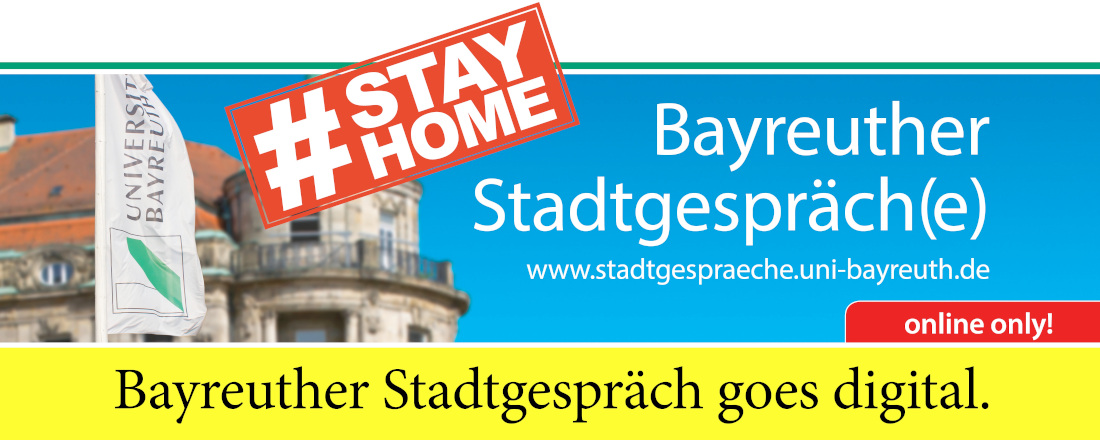Universität Bayreuth, Pressemitteilung Nr. 115/2020 vom 21. August 2020
Decisions are the only way we can actively influence what is important to us or our organization. Everything else ‘happens’. It is therefore surprising that decision-makers leave much potential for improvement untapped. In the September City Talk, numerous tips will be given on how we can systematically make better decisions and thus achieve what is important to us. About it speaks Prof. (FH) PD Dr. habil. Johannes Siebert from the Management Center Innsbruck.
Topic:
Give yourself a nudge: How to ‘nudge’ yourself to systematically make better decisions professionally and personally
Referent:
Prof. (FH) PD Dr. habil. Johannes Siebert, Management Center Innsbruck
Date / Time:
Wednesday, September 2, 2020, from 6 pm
Am Mittwoch, 2. September 2020, steht der Referent ab 19.00 Uhr für eine live-Diskussion via Zoom mit Zuschauerinnen und Zuschauern zur Verfügung: https://www.uni-bayreuth.de/de/campusleben/terminkalender/stadtgespraeche
To the lecture
“Decisions are the only way to actively influence what’s important to you or your organization. Everything else happens. Therefore, it is surprising how much potential for improvement decision-makers leave unused,” says the speaker of the September City Talk, Prof. (FH) PD Dr. habil. Johannes Siebert of the management center Innsbruck. According to Siebert, one way to help people make better decisions is to nudge them. Richard Thaler received the Nobel Prize in Economics in 2017 for this approach to behavioral economics. According to Siebert, so-called decision architects set a framework so that people increasingly make decisions that are good for themselves, but also for the community, while ensuring freedom of choice. “If, for example, in a cafeteria,” Siebert explains, “healthy foods are presented in an appealing way directly in the entrance area, then more healthy foods are usually consumed. However, it’s not always possible for a decision architect to ‘nudge’ you, or you may not want to. In the talk, I’ll show how you can ‘nudge’ yourself to systematically make better choices, and how to achieve what’s important to you. To do this, I’ll share numerous, easy-to-apply tips that, if followed consistently, will result in you being more satisfied with your life.”
To the speaker
Prof. (FH) PD Dr. habil. Johannes Siebert studied business administration at the University of Bayreuth (graduating in 2005), received his PhD in 2010 (topic ‘Multicriteria Decision Making’) and his habilitation in 2015 (topic ‘Behavioral Operations Research and Decision Analysis’). Since August 2017, Siebert has been teaching and conducting research at the Management Center Innsbruck in Austria. In addition, he is a private lecturer at the Faculty of Law and Economics at the University of Bayreuth.
The Bayreuth alumnus is considered one of the leading experts in the field of ‘Behavioral Operations Research and Decision Making’: In his research, Siebert investigates human and organizational decision-making behavior and develops methods for decision-makers, from individuals to large organizations, to make better informed His research is published in leading journals.
Siebert has more than ten years of experience in applied decision research. He has worked on and managed research and consulting projects for national and international clients from business, politics and society. For example, he has advised decision-makers at the Pentagon (USA) and the California Department of Transportation as well as board members of large German corporations. In the project ‚KLUGentscheiden‘, he and his team develop decision-making trainings and conduct them with students in Upper Franconia and the Upper Palatinate in graduating classes. Recently, the scientist was accepted into the advisory board of the renowned ‘Alliance for Decision Education’ around Nobel Prize winner Daniel Kahneman. Prof. (FH) PD Dr. habil. Johannes Siebert will use his expertise to help children and young people learn to make conscious and well-considered decisions away from the usual ‘try and error’.
Source: University of Bayreuth, Pressemitteilung Nr. 115/2020, 22. August 2020 (Translation)

Leave a Reply